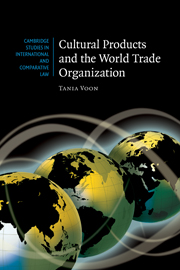Book contents
- Frontmatter
- Contents
- Detailed chapter outline
- Table of GATT/WTO agreements
- Table of GATT/WTO cases
- Table of abbreviations
- Foreword
- Acknowledgements
- Part I Stalemate and its ideological origins
- Part II Options for the future
- 4 Resolution through dispute settlement and international law
- 5 Constructing a new agreement outside the WTO
- 6 Improving the existing WTO agreements
- 7 Conclusion
- Bibliography
- Index
7 - Conclusion
Published online by Cambridge University Press: 23 February 2010
- Frontmatter
- Contents
- Detailed chapter outline
- Table of GATT/WTO agreements
- Table of GATT/WTO cases
- Table of abbreviations
- Foreword
- Acknowledgements
- Part I Stalemate and its ideological origins
- Part II Options for the future
- 4 Resolution through dispute settlement and international law
- 5 Constructing a new agreement outside the WTO
- 6 Improving the existing WTO agreements
- 7 Conclusion
- Bibliography
- Index
Summary
The movement of goods, people, and services has played an important role in the evolution and dissemination of culture throughout the world for thousands of years. However, the new scale of international trade has made cultural homogenisation a significant public concern about globalisation. The fear that cultural identities, traditions, and rituals are under threat is part of a broader anxiety about growing interconnectedness and faster rates of change in life. In addition to unease at the level of individuals, cultural and many other industries face increasingly intense competition from global sources. Perceived conflicts between trade and culture arise at many levels (local, national, regional, and global) and in relation to many things, from agriculture and tourism to handicrafts and sacred sites.
This book has attempted to contribute to the debate on trade and culture with respect to one particular aspect: cultural products in the context of the WTO. Given the size of the WTO Membership, the scope and complexity of its framework of binding rules, and the increasing amount of international trade in goods and services, the WTO is an obvious choice for assessing the legal aspects of trade in cultural products. These products of the cultural industries – especially film, radio, television, sound recording, books, magazines, periodicals, and associated services – present some of the most difficult conceptual questions in balancing cultural values and the objectives of trade liberalisation, precisely because of their substantial economic implications. They also lie at the heart of WTO Members' concerns in relation to culture.
- Type
- Chapter
- Information
- Cultural Products and the World Trade Organization , pp. 248 - 256Publisher: Cambridge University PressPrint publication year: 2007



